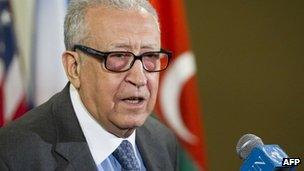Syria conflict: Envoy Brahimi hails US-Russia accord
- Published

The UN-Arab League envoy for Syria, Lakhdar Brahimi, has hailed a US-Russia commitment to work together to end the conflict in the country.
He said it was "the first hopeful news" on Syria for a long time, but cautioned that it was "only a first step".
On Tuesday, the US and Russia agreed to convene an international conference to find a political solution on Syria.
US Secretary of State John Kerry said they would encourage both Damascus and the opposition to negotiate.
The deal came after Mr Kerry's talks in Moscow with President Vladimir Putin and Foreign Minister Sergei Lavrov.
'Wake-up call'
"This is the first hopeful news concerning that unhappy country in a very long time," Mr Brahimi said in a statement on Wednesday.
"The statements made in Moscow constitute a very significant first step forward. It is nevertheless only a first step."
Speaking to the BBC shortly afterwards, Mr Brahimi said he hoped the Moscow announcements would be a wake-up call for all concerned, and that they would now think only of the Syrian people and how Syria could be saved.
More than 70,000 people are estimated to have been killed since the uprising against President Bashar al-Assad began in March 2011.
Mr Brahimi also stressed that the US-Russian accord meant that the UN Security Council would now be able to function again.
The council has so far failed to act on the Syria issue amid differences between the five veto-wielding nations - including Russia.
Russia, which supports Mr Assad, has refused to back US pressure designed to force him to step down.
Many Syrian opposition groups balk at the idea of negotiating while Mr Assad and his associates remain in power, though that is what the Americans now seem to be proposing, the BBC's Jim Muir in Beirut reports.
Mr Kerry and Mr Lavrov had announced in Moscow that they would try to organise the international conference - if possible before the end of May.
The forum will try to convince both the Syrian government and opposition to accept a solution based on the core elements of the final communique issued on 30 June 2012, after the UN-backed Action Group for Syria meeting in Geneva.
Before the Moscow announcements, Mr Brahimi himself had been on the brink of resignation as the special envoy for Syria, but that now seems no longer to be the case, our correspondent adds.
The communique called for an immediate cessation of violence and the establishment of a transitional government that could include officials serving under President Bashar al-Assad and members of the opposition.